My Africa: Gambia

This was our second trip to Africa, after a previous resort stay in Tunisia, we decided to plunge deeper and visit the Gambia, also called the Smiling Coast of Africa. This tiny country is in West Africa, surrounded by Senegal and the Atlantic Ocean. It has a unique shape of an irregular sliver that sets it apart amidst the African countries mostly chopped up into geometrically regular units. The Gambia is often described as Africa for beginners, and beginners to this grand continent we truly are. Scared, insecure, vaccinated to the gills against everything and well stocked with anti-malaria pills and mosquito repellent. Most Gambians speak English due to their colonial past, the country is considered one of the safest and the people live harmoniously with each other and welcome tourists. But I still felt strange and undecided almost until the very day of our flight. The husband is always on the lookout for exotic places and uncharted locations. Our child dreams of becoming a new Indiana Jones, so in between these two and their boundless enthusiasm, my misgivings or fears seemed immaterial. So off we went, to our own "Heart of Darkness".
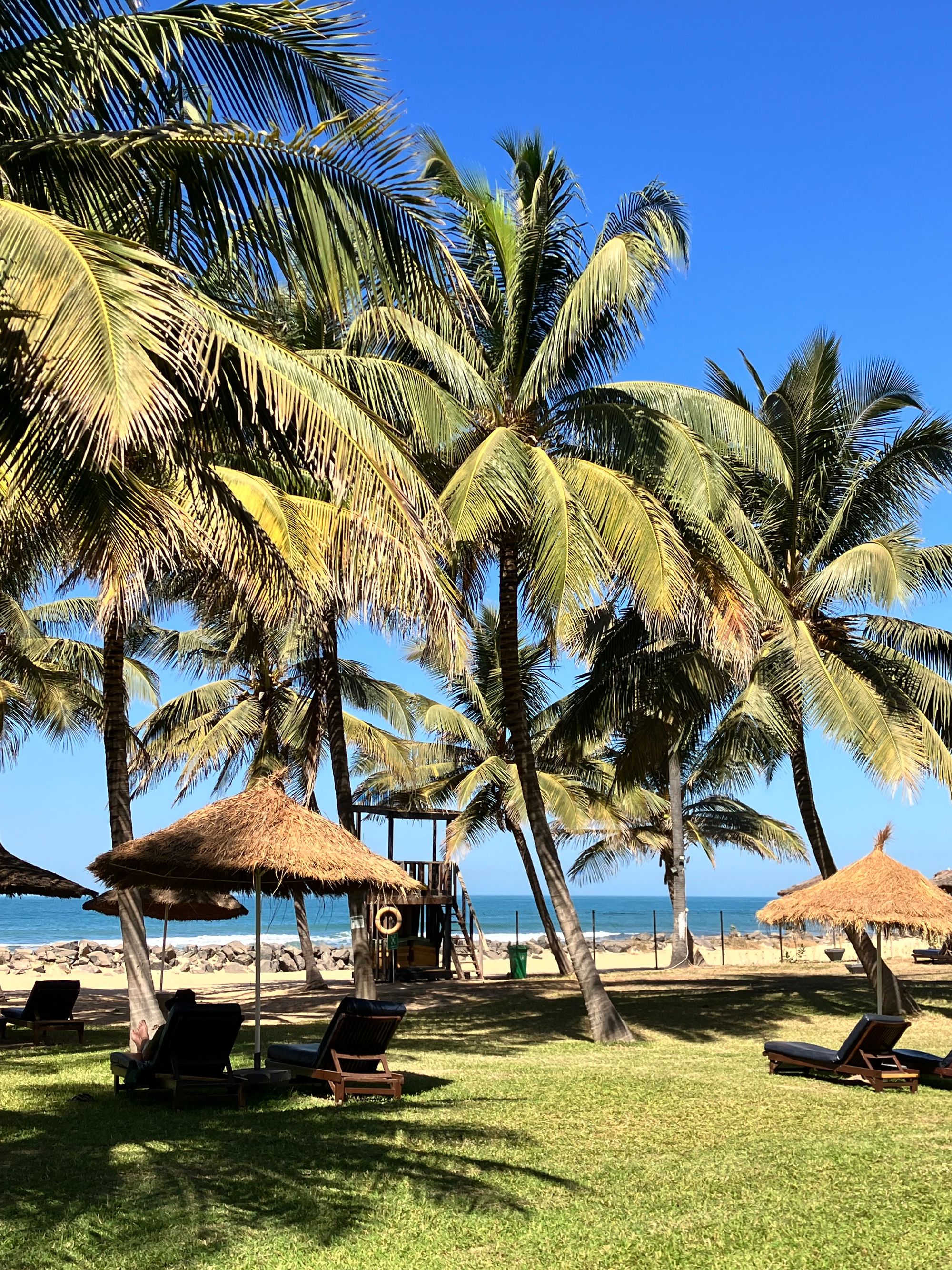
There are so many things to notice upon arriving in Gambia. The multitudes of people, mostly young, tall and long-limbed, beautiful, strong and confident. They emerge from the night, crossing the highway nonchalantly, busy and determined, smiling broadly. The bright, vivid patterns of their tunics, turbans, and frilly dresses flash and disappear again into the darkness uninterrupted by street lights. They resemble fireflies. Then, there is the heat that is not humid or sticky or scorching, but envelops you and at the same time coats you with a film of orange dust that brings images of a messy wedding henna painting. Roads, buildings, cars, and people are stained with it.
The sun is different there too, it is a huge, almost dilated ball of red and orange pouring down, reminding you of the sun as depicted in Survival, one of television's longest-running and most successful nature documentary series of all times. That series marked my childhood, it was an inevitable part of growing up in the Balkans. If you haven't at least once been late for school because you watched Survival, have you even been a kid in former Yugoslavia? The fiery sun is one of its most memorable images, rising and setting into the savannas of, say, Uganda. And after all those years, you encounter it and it's exactly like that, majestic, larger than life, and simply different from the European, let alone northern sun. Â
At the time of sunset, around 7 pm, the place to be is the beach. The Gambia faces West so its beaches are ideal to watch the sun set over the ocean. The currents of the Atlantic Ocean are so strong that people mostly dare to test only the shallow waters during the day. But in the dusk, you see nimble shapes of surfers' bodies harnessing the strong waves, their silhouettes bobbing on the horizon. The fruit ladies are traversing the beachfront, in the hope of peddling the content inside the hampers miraculously balanced atop their heads. For vacationers, this is the last chance for a beach walk before the wrath of killer mosquitos descends upon us all. The sound of a saxophone, rich, warm, and classy, drifts from the nearby bar and always evokes memories of our wedding day. A core memory, another golden ball sliding into its designated sentimental slot within my husband and me. Play it, Sam. Being so near the Equator the sun goes down very quickly, it flops kamikaze-style into the Atlantic Ocean in a decadent rush. You manage just a few sips of a cocktail, and it is already gone. But the minutes leading to the final dip are distilled magic because the whole world seems colored copper, golden, and tangerine. As if all of God's mercy engulfs you at that moment, and you remember why people used to worship the Sun as a deity.
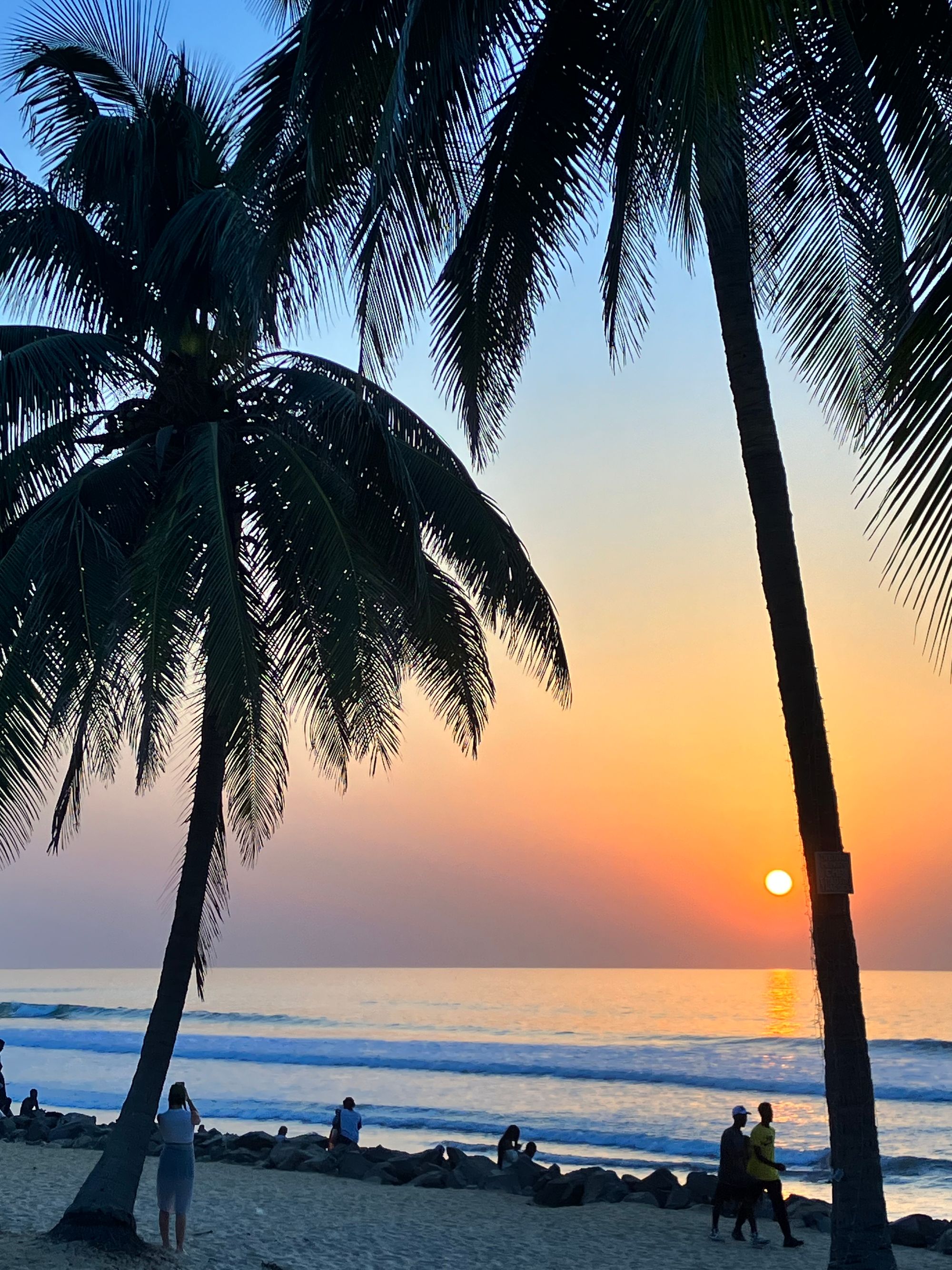
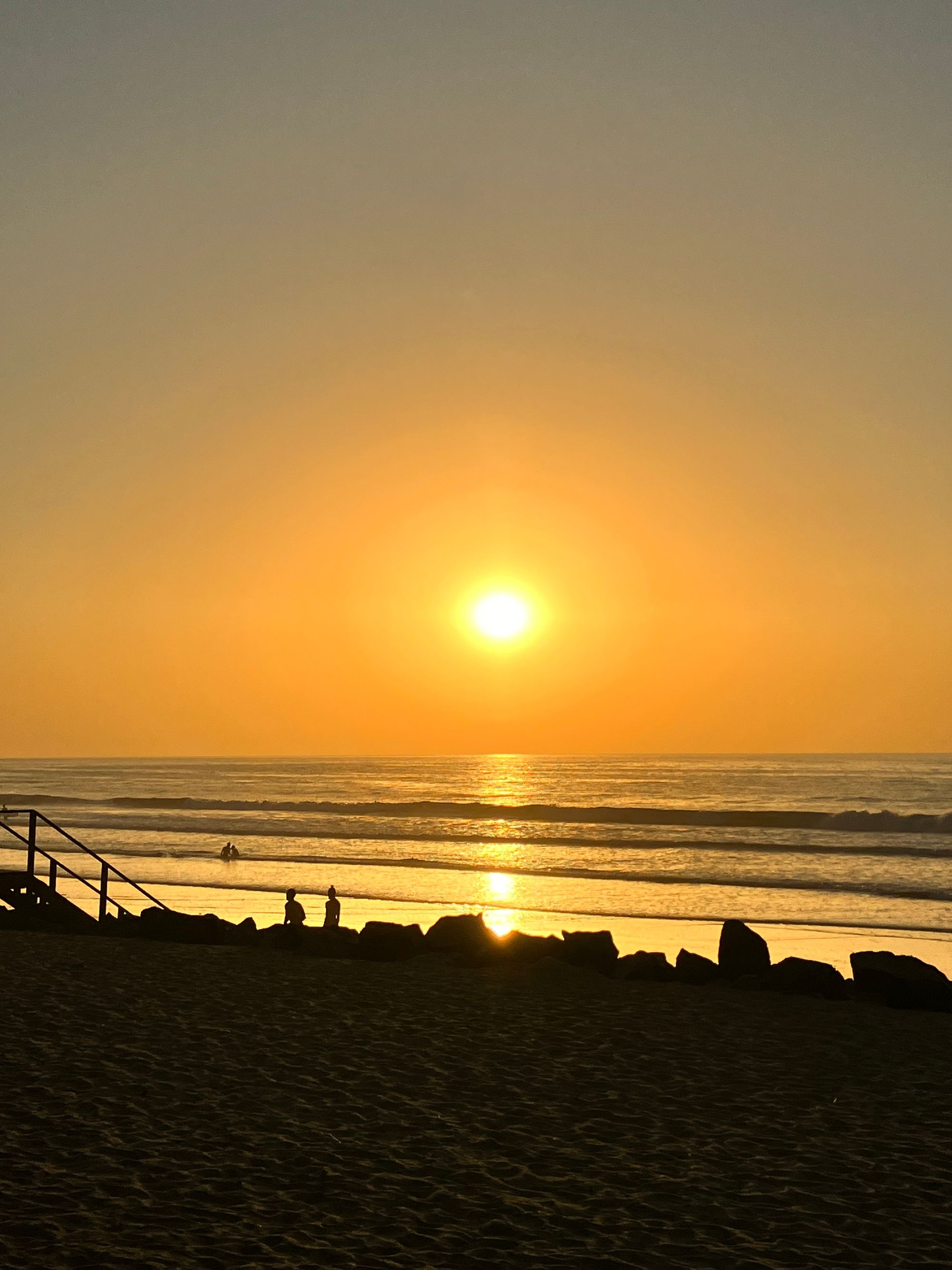
We stayed in an obscenely luxurious resort for the local standards. A lush property intended for privileged north European tourists, was overgrown with palm trees, and baobab trees, and infested with a large family of cheeky, stealing, green monkeys. It felt like something out of a shocking, politically incorrect book nostalgically describing colonial times, with Europeans tucked away in a gated community, dressed in khaki, having forever a cocktail hour and resting in their cooled villas amid the coconuts. I did my best to push away such thoughts and images, but colonialism and its residues scream here at you. With all of that being said, beauty is undeniably beauty, and taking a walk every day to a pool overlooking the beach, was a pleasure and luxury beyond my wildest imagination. I savoured it all. Mere staying in such a hotel ruins all your chances of ever buying anything affordably outside of the resort because people place you in a certain pay grade by association. And that's a pity because then there are the markets.
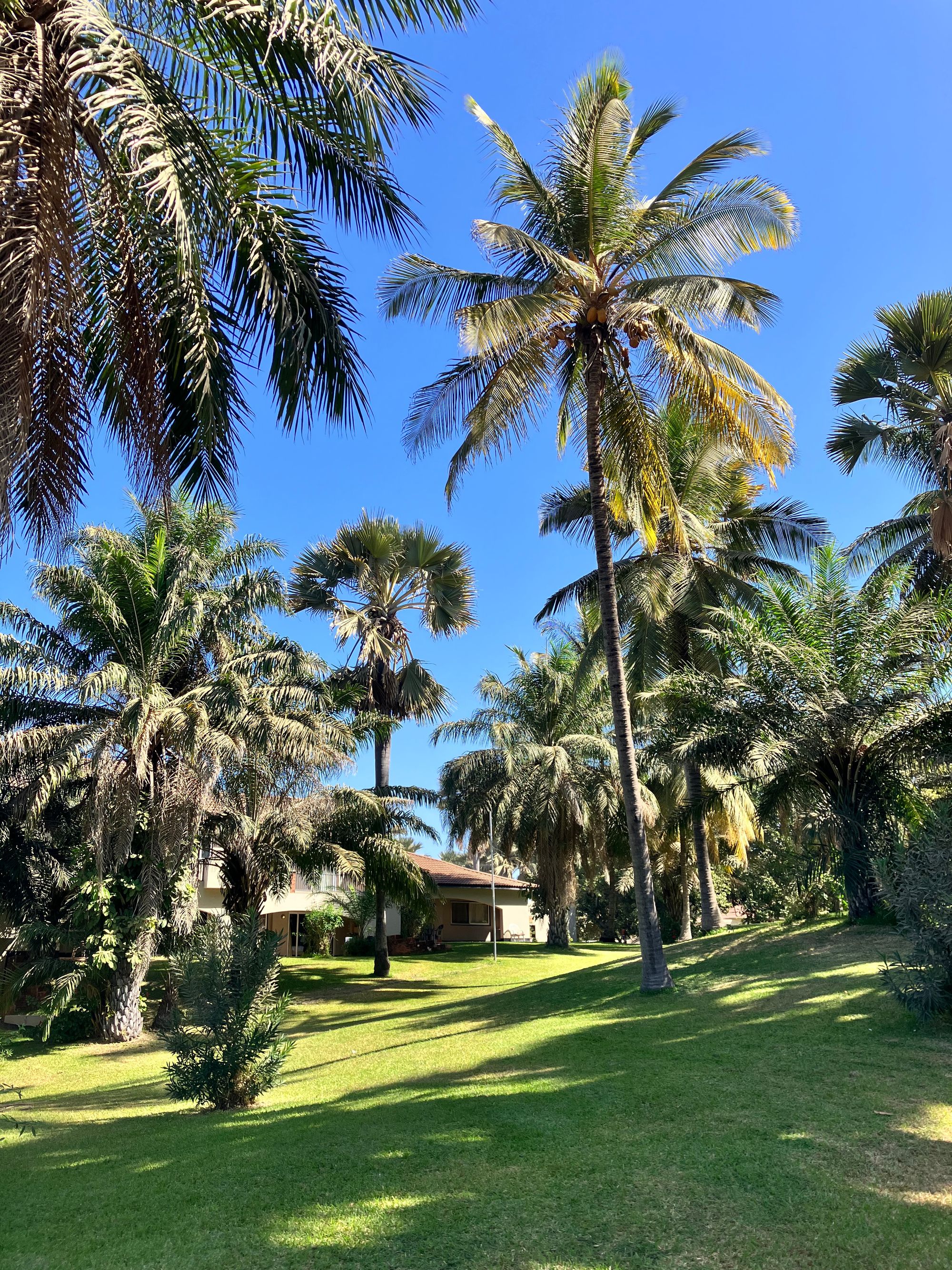
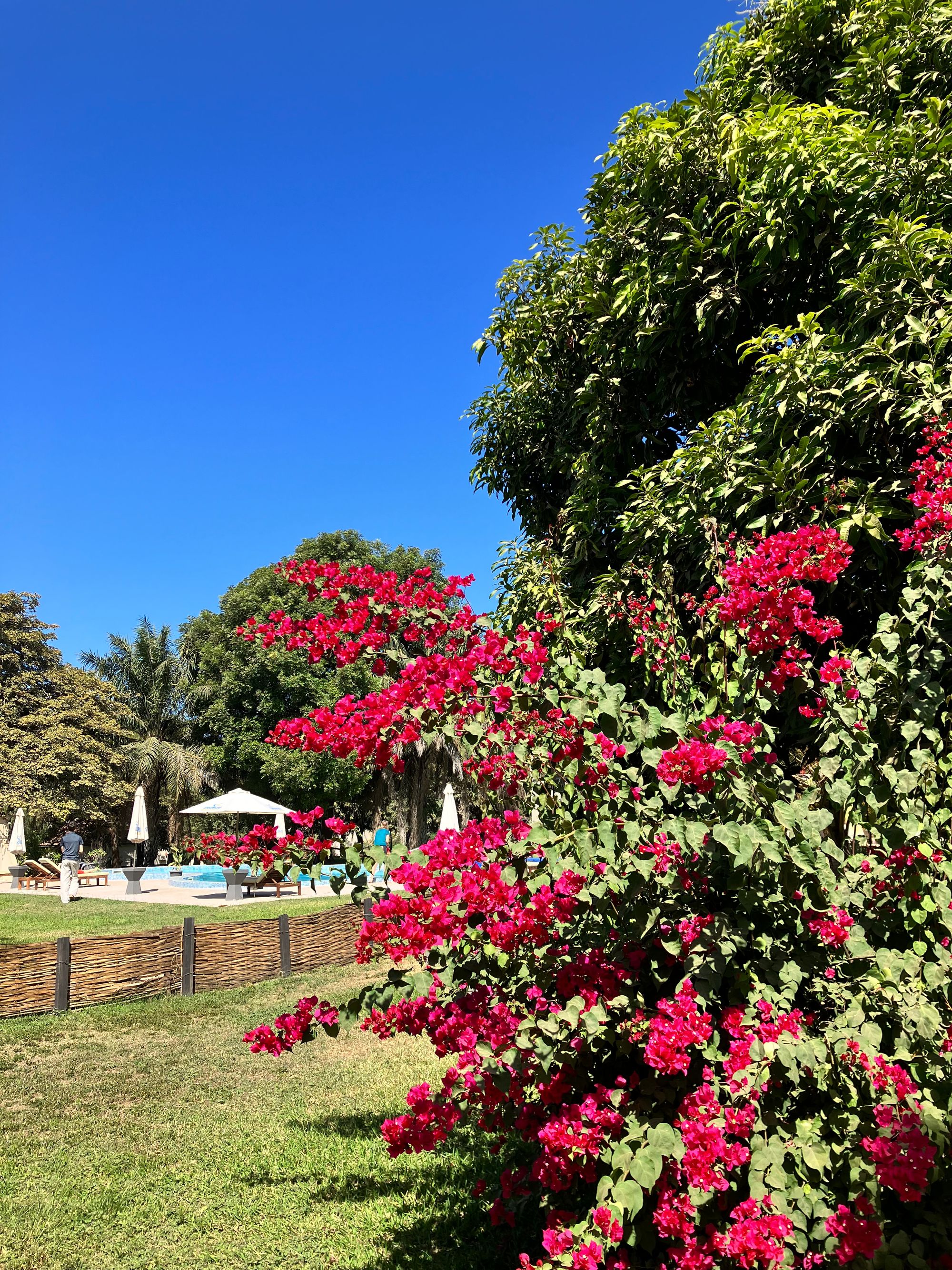
There is much to see in the local markets, the one in the commercial centre of the country, Serrekunde being the most famous. Wherever you look, you see plenty of frenzied buying, trading, bartering, and bargaining. Necessary haggling skills for this sport, sadly surpass mine. It is intoxicating even just to watch, sandy streets of flimsy stalls stacked with shimmering, boldly patterned fabrics, plastic knock-offs of famous brands, shoes, used cars and car parts, kitchen appliances, fresh food, sugary juices made of baobab tree fruits and hibiscus flowers. Â A myriad of colours and flavours of the fruit and vegetable market, craft stalls where tourists buy overpriced souvenirs and local art, polished animals carved out of ebony and mahogany.
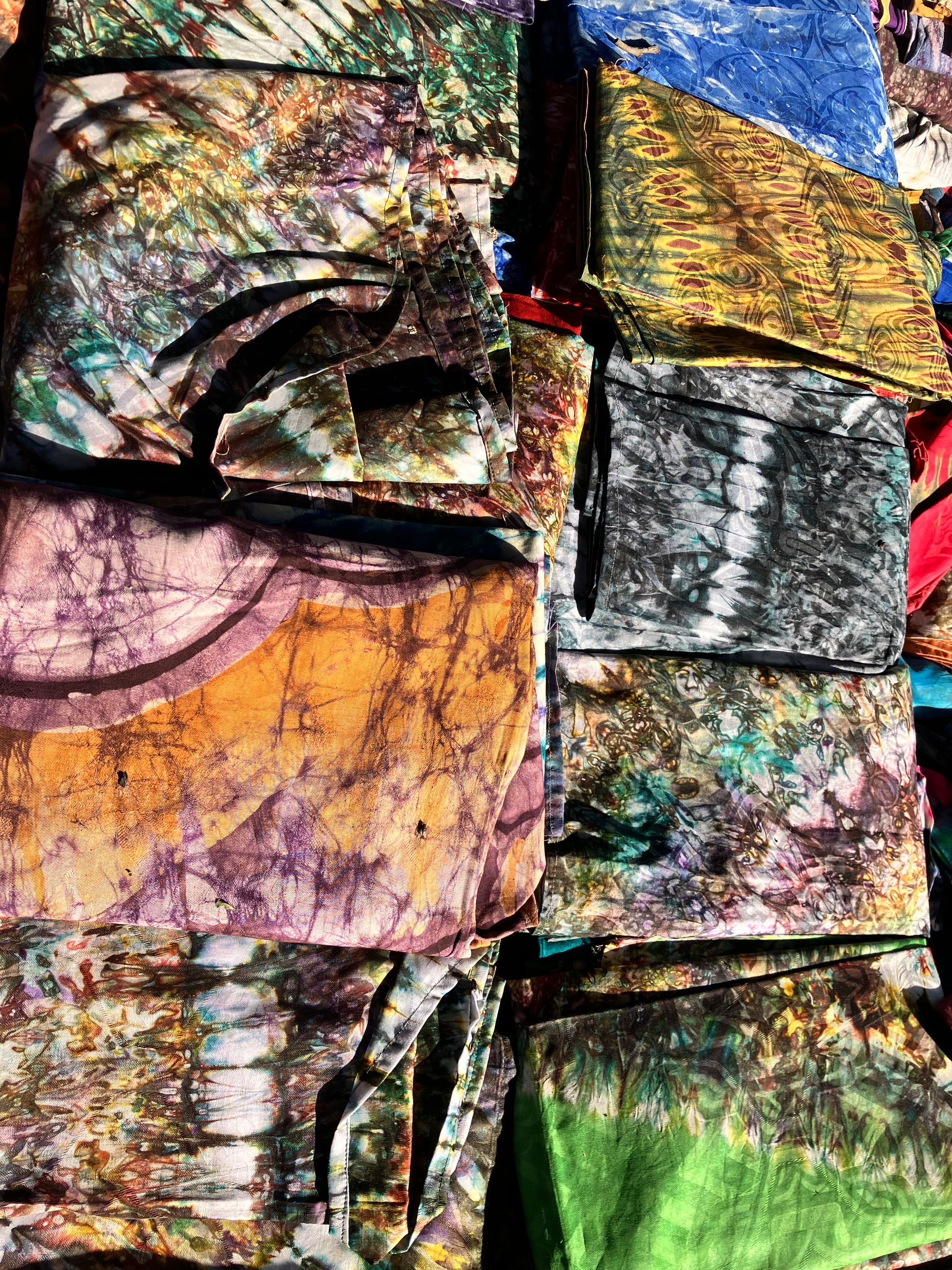
The most random, illogical scenes develop naturally in front of you. Advertisements offer chairs for rent. A priceless Maserati drives by, leaving donkey carts in a swirl of dust. The regal-looking women dressed so extravagantly, so over-the-top noticeably come to the market and bargain for a live chicken or two. A barber puts a plastic chair in the middle of the sidewalk and his customers get their haircut or get clean shaved in the middle of the passing crowds. No one is perturbed by this, and there is no need for running water, mirrors, electricity, or any other amenity of a barbershop. I didn't stay long enough but wouldn't be surprised if the result was more satisfying than in Europe. A butcher's shop is wherever someone decides to hang a dripping carcass, without a fridge during a typical day of 33 degrees Celsius. The only concession to hygiene is a fly swatter that is energetically used to discourage the insistent, hungry insects that mercilessly attack the perishable meat. Nowhere else did going vegan appeal more to me.
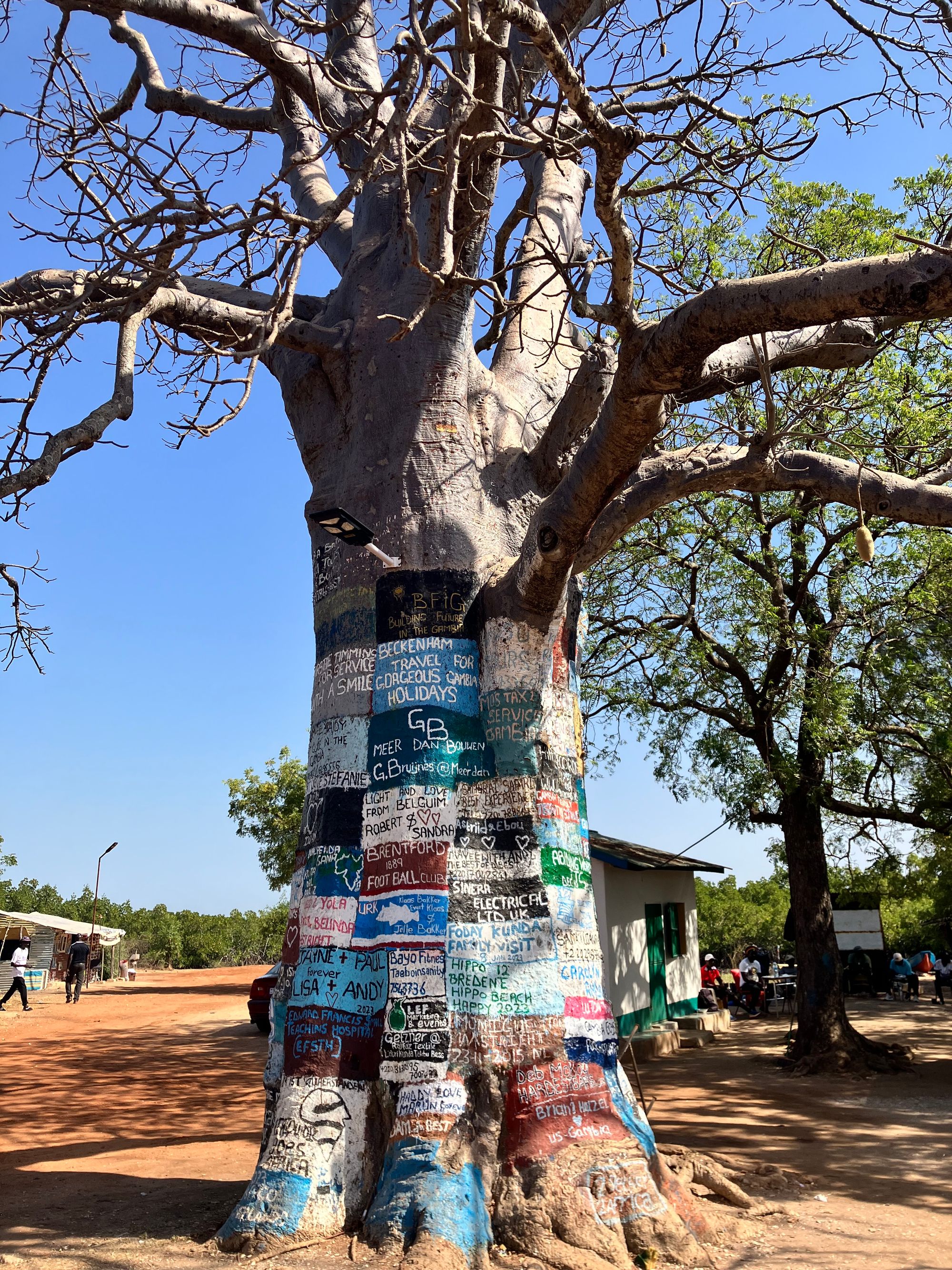
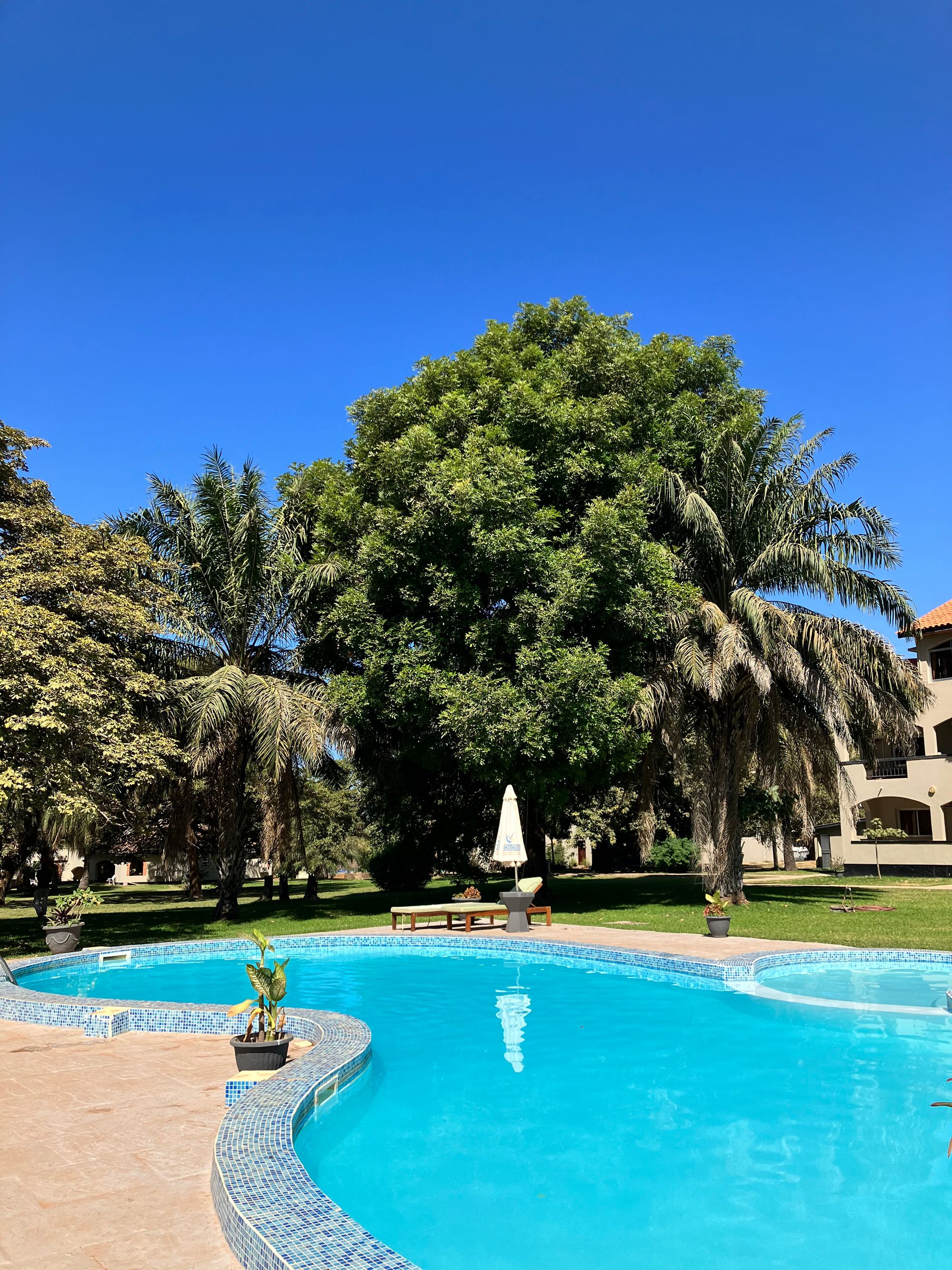
Gambia is a well-known destination for bird watching, and the hotel gardens were full of the most exotic, unusual, most colorful creatures. Sunbirds, kingfishers, ibis, even their names sound evocative and aesthetically pleasing. Â Their high-pitched but upbeat cries and calls, the chirping sounds we were immersed in over every breakfast on our balcony, are something I will surely miss. The weather was so mild, mellow, and sunny every day, that ideal pool days followed one another effortlessly. I noticed that the guests scattered around the pool predominantly chose to read murder/thriller mysteries in this absolute paradise. I don't have high hopes regarding the reading taste of most people, but I thought there might be more to it than just a proclivity to mindless reading material while on vacation. It made me think that we humans have a certain inability to cope with beauty if it is pushed to the extreme, too sublime and overwhelming. Perhaps we seek to balance it out somehow, to throw in something gory for good measure. To ward off evil eyes away from the tropical bliss. Hence, the detective reads soaking atop the sunchairs. Let's call it "can'tstandness". Funny creatures, us humans.
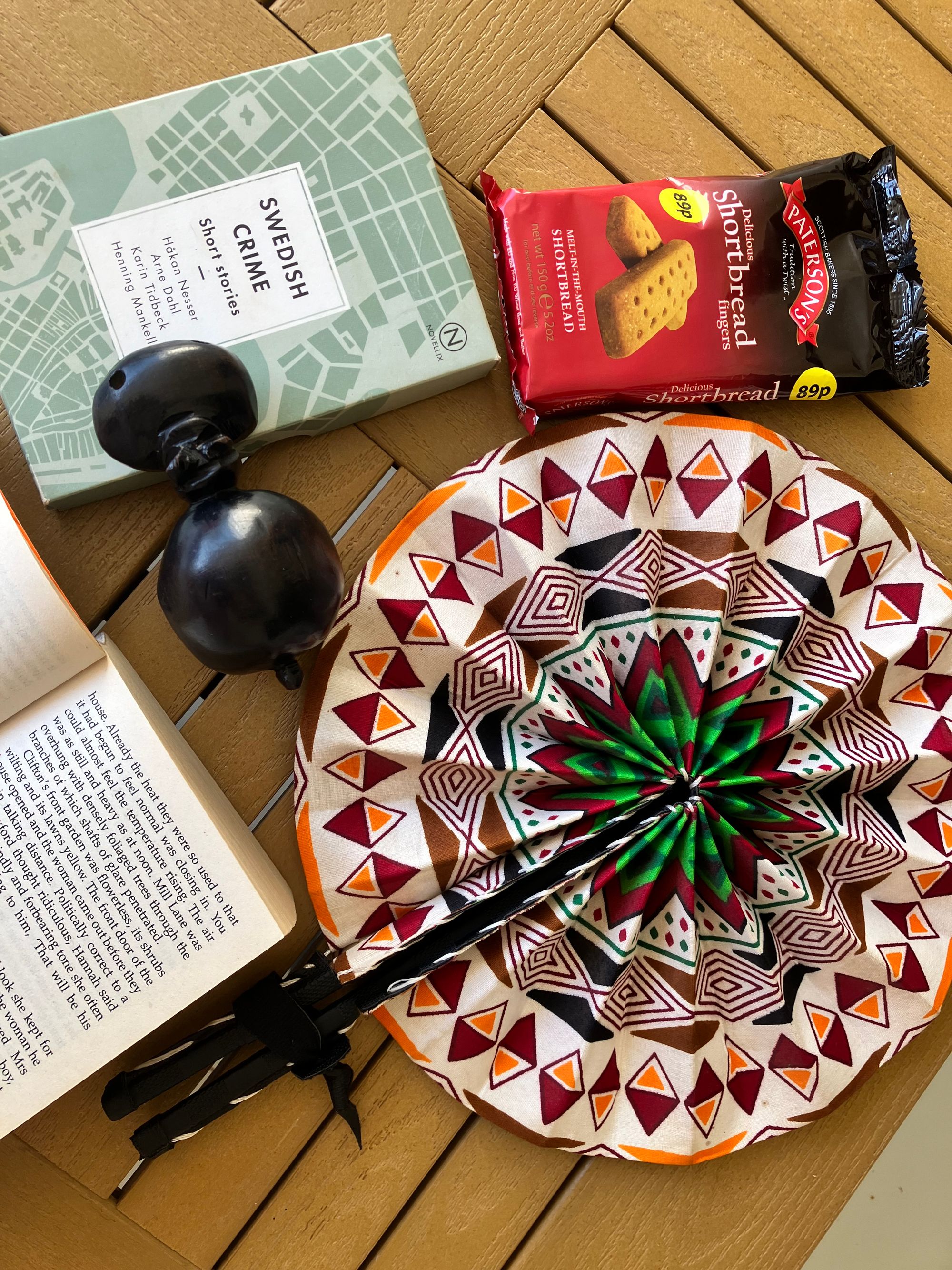
In a restaurant, it usually takes a very long time for the food to arrive, and there is a certain absence of hectic rush that characterizes any business setting in the West. It could be argued that it is a comforting idea not to be easily ruffled and to do everything at your own pace. As a customer, it can be unnerving to wait for 40 minutes for something as simple as fish and chips in a restaurant where you are the only customer. But if you manage your expectations, go for local dishes such as domoda, a national peanut stew, or rice benachin with fish. Generally speaking, any seafood would be a good choice in Gambia. It was surprising though that certain foods that we associate with Africa, are not to be found there. Coffee, or chocolate, strongly bringing images of endless coffee plantations or cocoa beans grown in West Africa, are luxuries meant for export only.
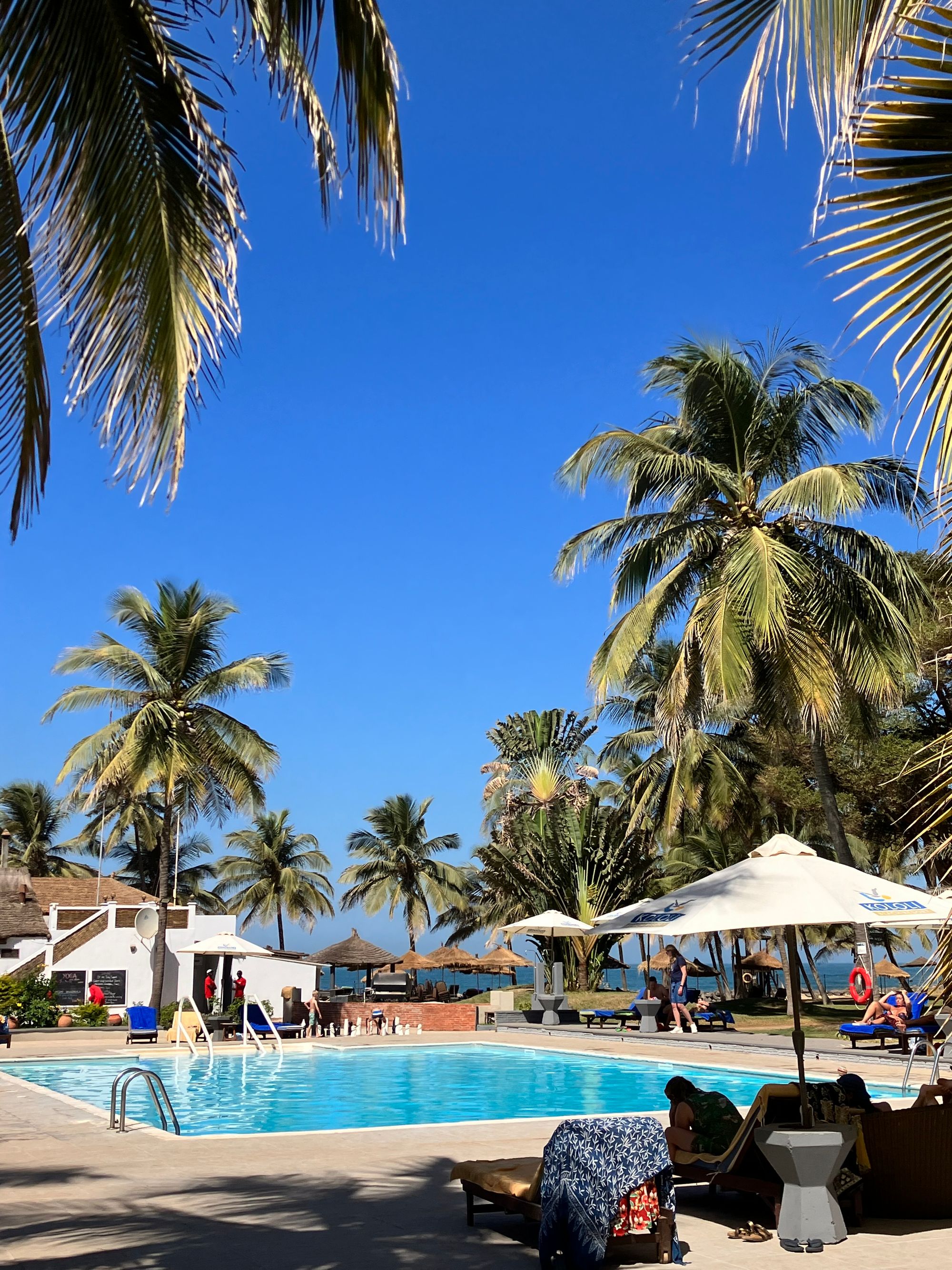
The true adventure though, starts outside the hotel gates. So much to see, understand, taste, and experience. Gambia was a British colony, and you might be excused for thinking that it never stopped being that, on account of multitudes of British tourists, who don't look like they are staying for a mere fortnight there. They seem positively settled, with their own houses, drivers, help, and more often than not, with their local girlfriends/boyfriends. They frequent supermarkets that sell British tinned tea, authentic biscuits, beer, and Cadbury chocolates, somewhat melted after everything they have been through. All the restaurants offer real full British breakfasts, obligatory fish and chips, and there are football matches on the TV (or is that telly?) Â always showing the English League. Many streets, bridges, and public places are still called by their old, colonial names honouring some former administrator or the other. Â It often feels as if you're in Sussex minus the cold. A bizarre feeling of the same but not quite.
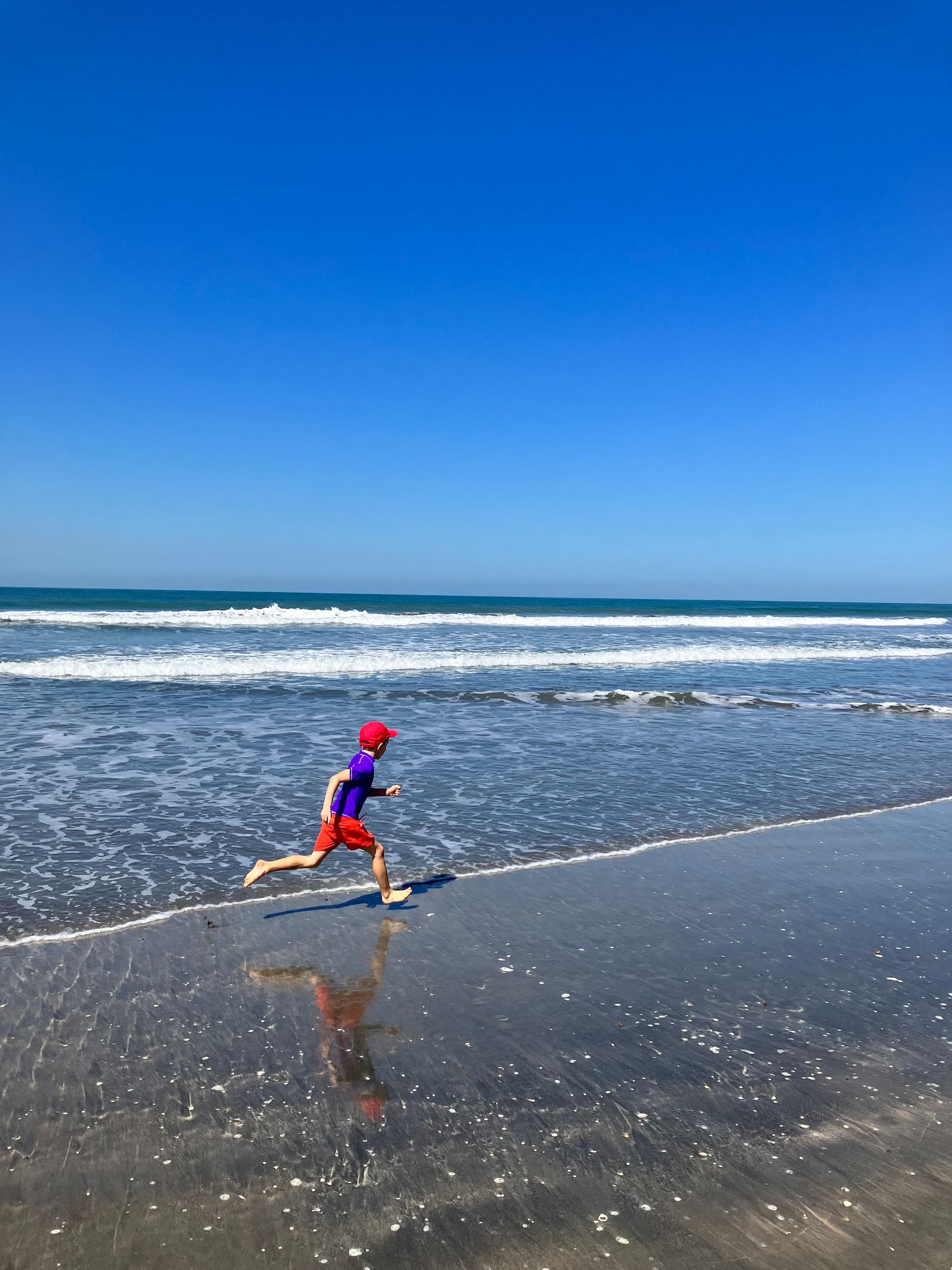
The Gambia owns its name to the river Gambia. It is a long, wide river beginning in Guinea and flowing into the Atlantic Ocean. The country is composed of two sides of the river and due to its navigability the river was the only thing that the British wanted during the colony grabbing. The cruising down the Gambia river was a beautiful pensive experience, a slow drift in a local pirogue boat, between the thick mangroves where, curiously enough oysters are farmed. Such an extravagant creature, even more luxurious food, grown there in the murky water, clinging desperately to the mangrove branches, which are also called upside down trees. The sight strangely reminded me of the vines heavy with grapes somewhere in the Mediterranean.
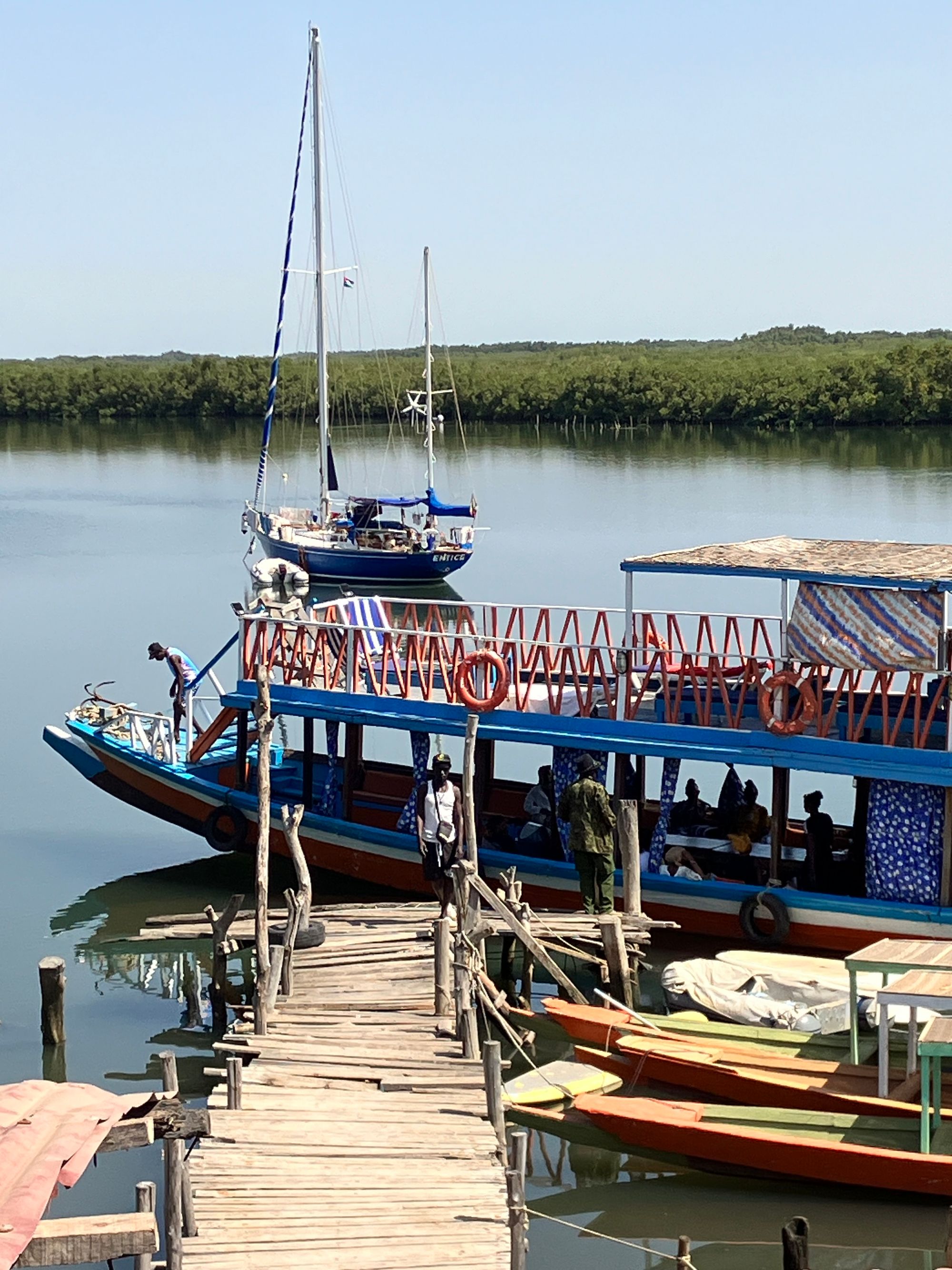
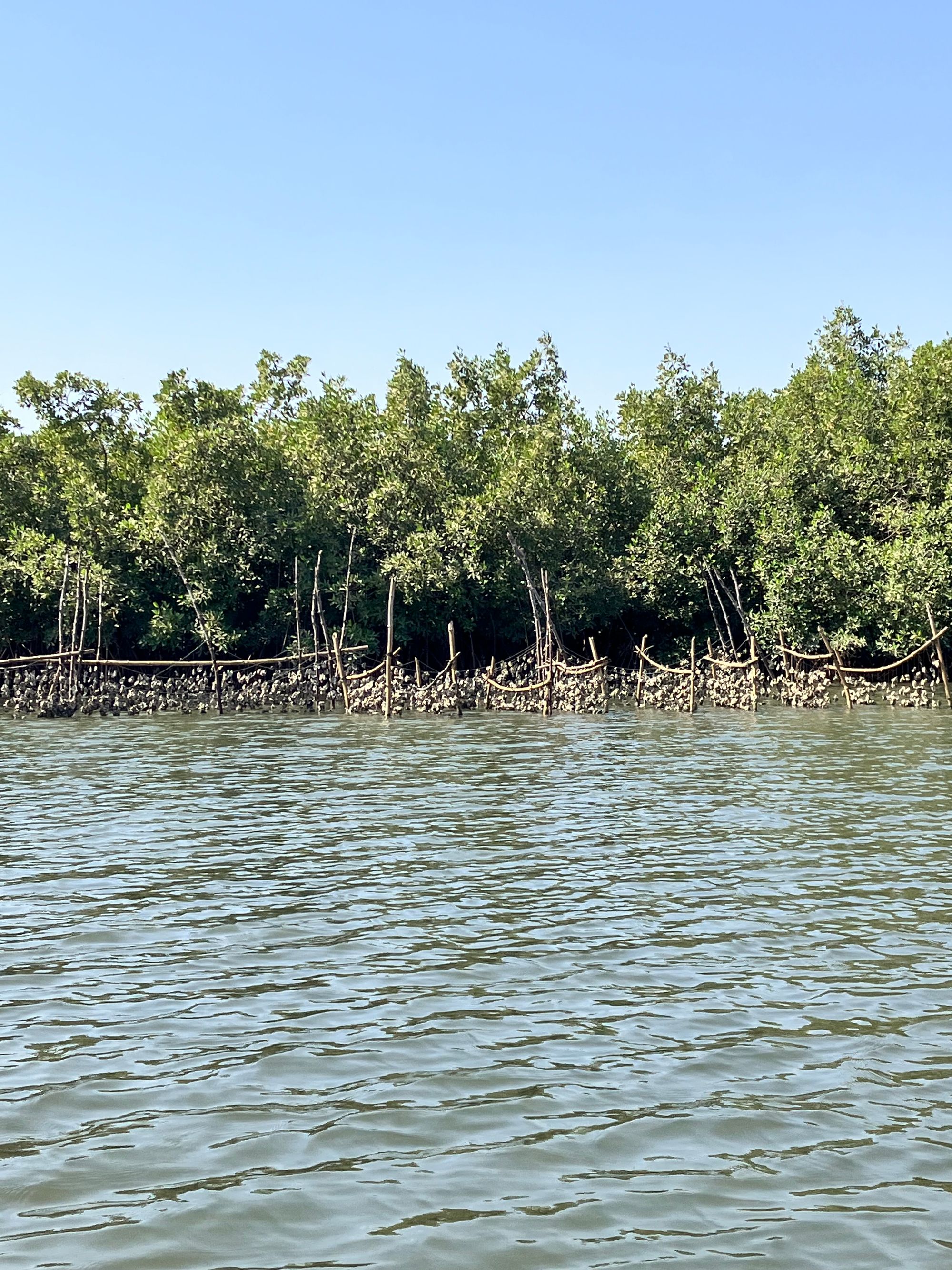
There is a unique watery traffic in action there, small pathways are hacked into the dense shrubbery so that the women who collect the oysters when the river ebbs (of course, it's the women doing that work) can pass through on their harvesting way. Â It is very quiet on the river, and the meditative silence gets broken only occasionally by a bird in low flight. Fancy boats used for housing, moored inexpensively there tell a story of gallivanting adventurers. All of these stories co-exist harmoniously, and for an additional twist, there is even a small island in the middle of the river, that hosts music parties during nighttime.
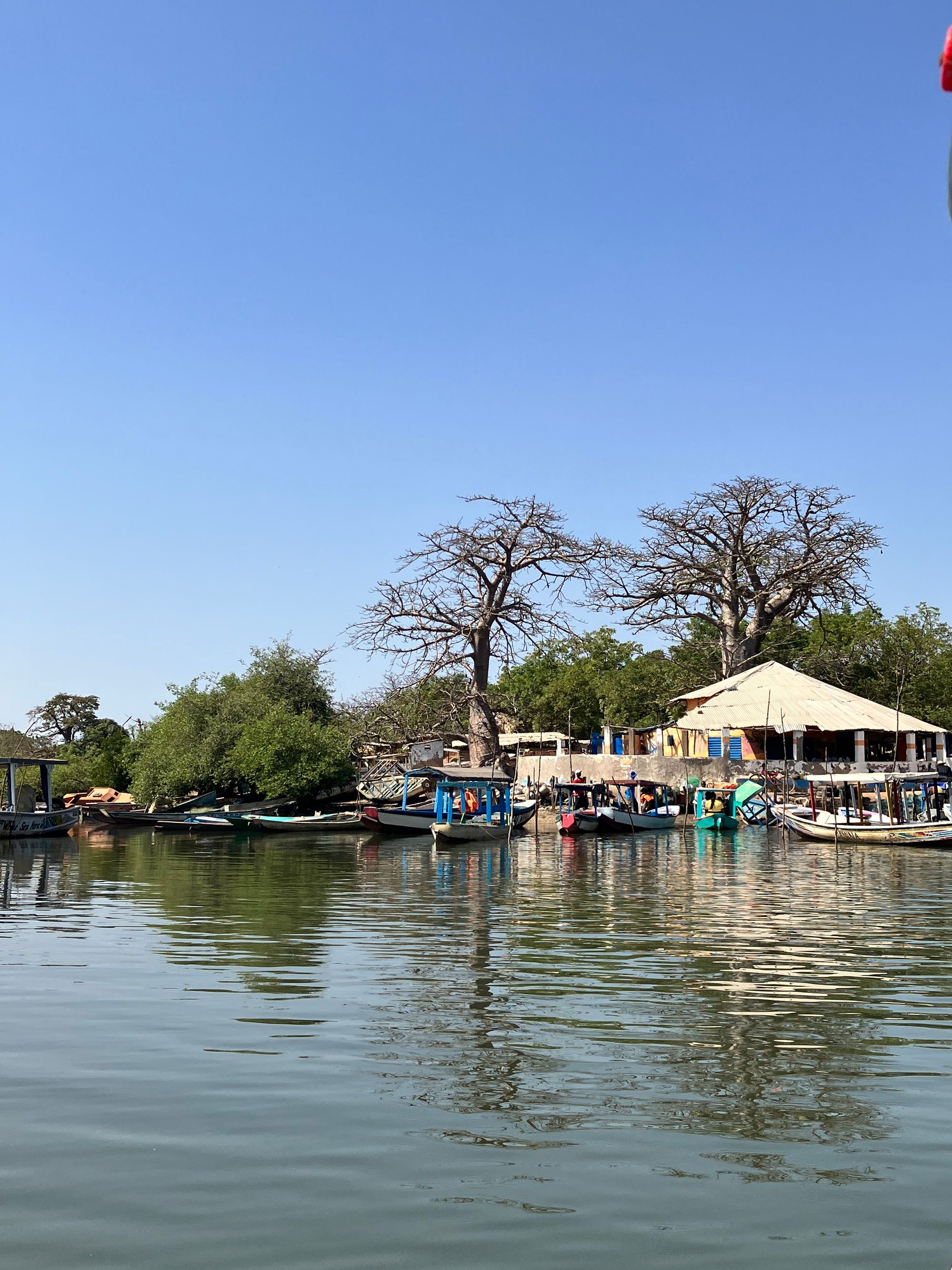
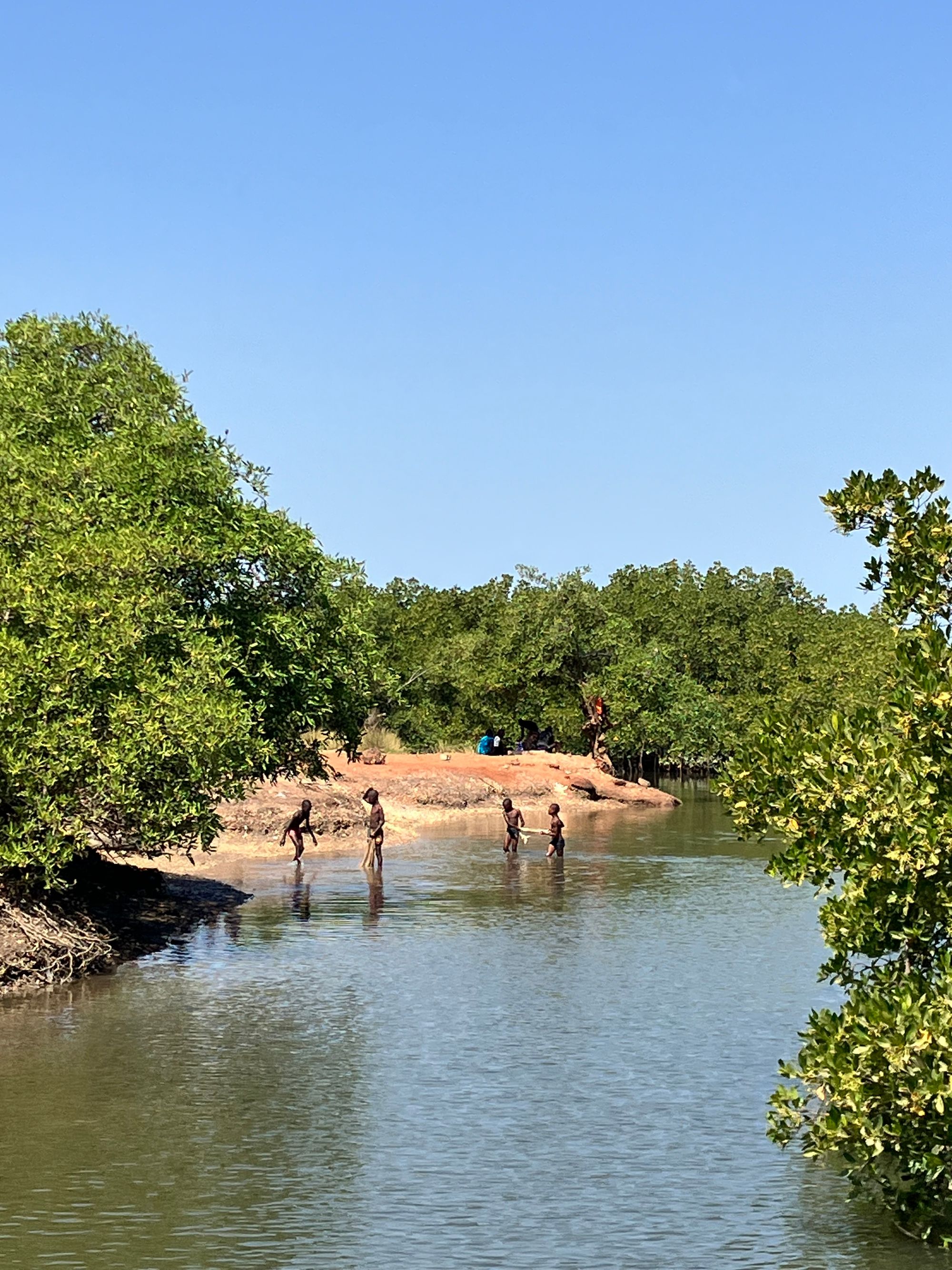
The experience that is synonymous with visiting Africa and the strongest memory we take from it is a safari. You need to cross the sea and visit Senegal for that, so the day starts very early, in the company of local guides. You take a ferry from the capital, Banjul, and you already see thousands of wonders on the way. You pass by a giant anchored ship that allegedly produces electricity in some mysterious way. Many people take water taxis, which are larger pirogues in fact, but to enter them, they need to be carried on the backs of others. It can't be an easy line of work, but there is a lot of banter, laughter, and joking about this among the carriers on the beach. You can buy balls of colored ice encased in plastic wrappers, and you suck on them to cool off. Girls are filling plastic bottles from the local taps, and selling them as bottled, purified water. At the end of the ferry trip, the used bottles are retrieved, and the process is repeated. No one questions the cleanliness of the procedure. Goats, tourists, vendors, babies sleeping peacefully in the batik slings of their mothers, countless bulging sacks, and poultry with their legs strapped, they all travel together to Barra.
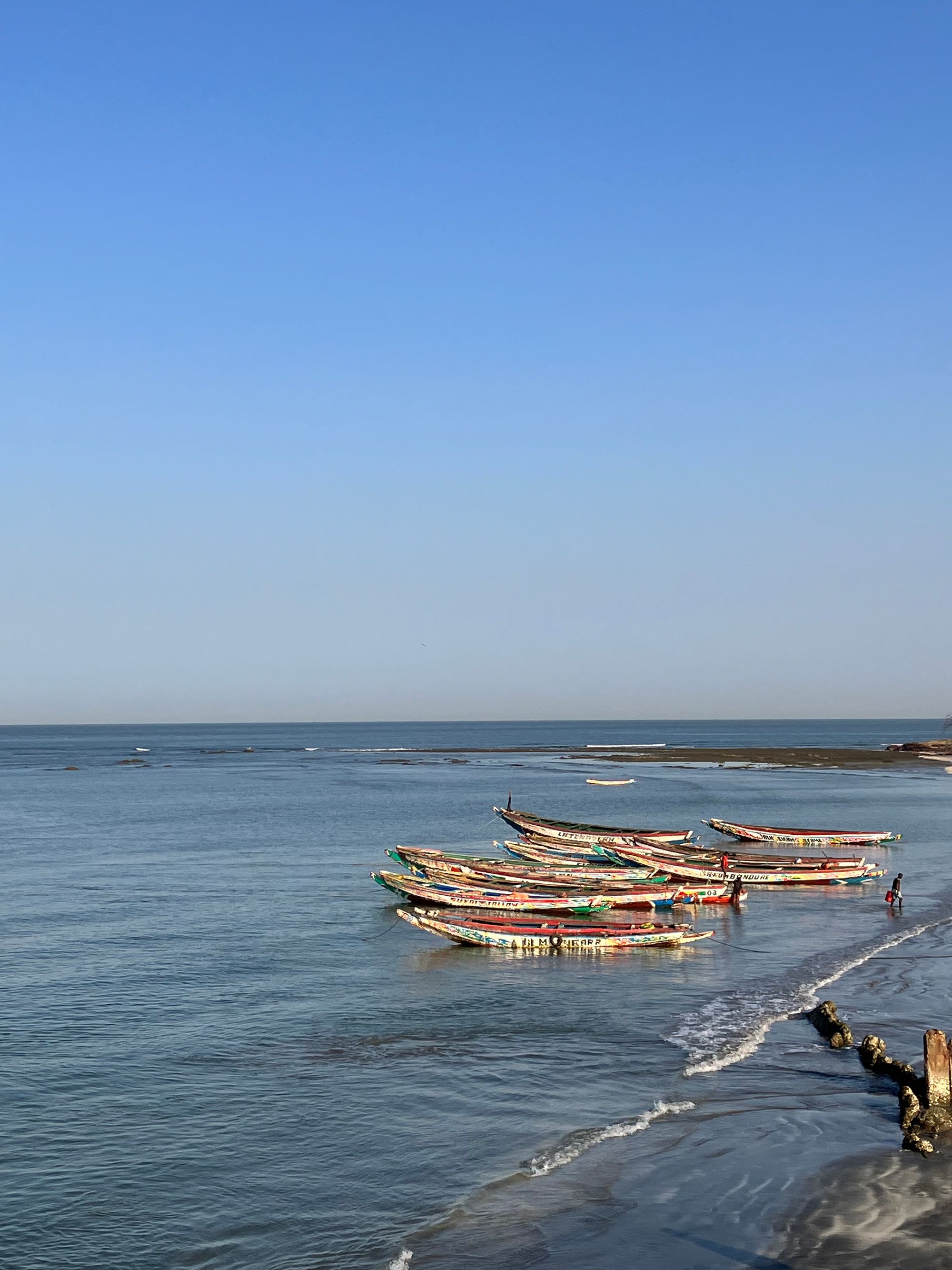
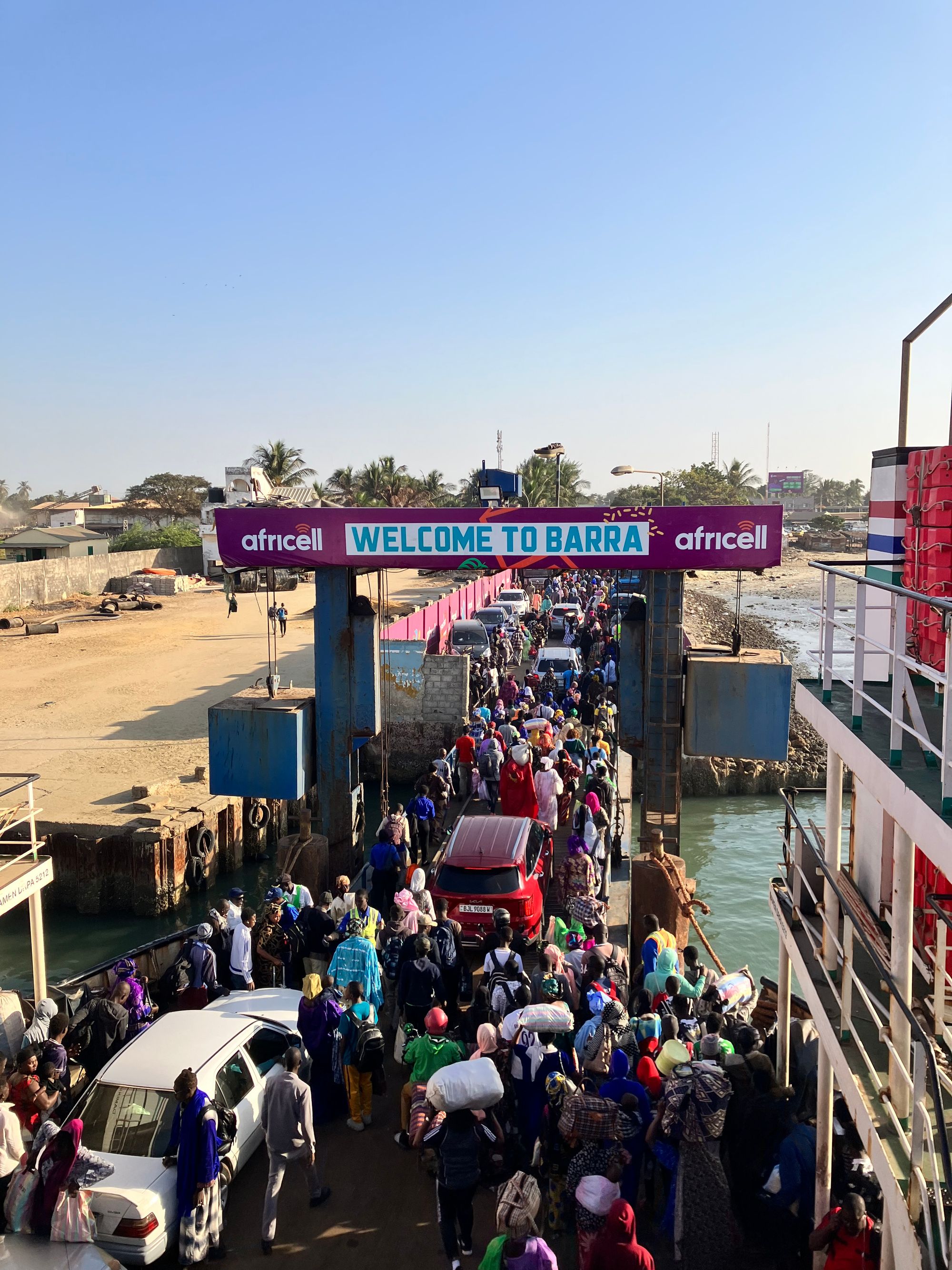
From there, you are driven into Senegal at the back of an SUV and on that dusty road you see everything that is wrong with the world. The grand awakening. You see poverty, deprivation, hopeless suffering and struggle everywhere. But poverty porn has never attracted me as a genre, so I cannot bring myself to say more about that. Then, finally, the reward of all rewards: the safari park. A huge, intact natural reserve where wild animals have enough space to roam, and where they live freely, peacefully, and sovereignly rule their environment. This was a completely different experience than seeing animals in a zoo. I have understood completely how depressed and unnatural the caged animals are while looking at their free counterparts.
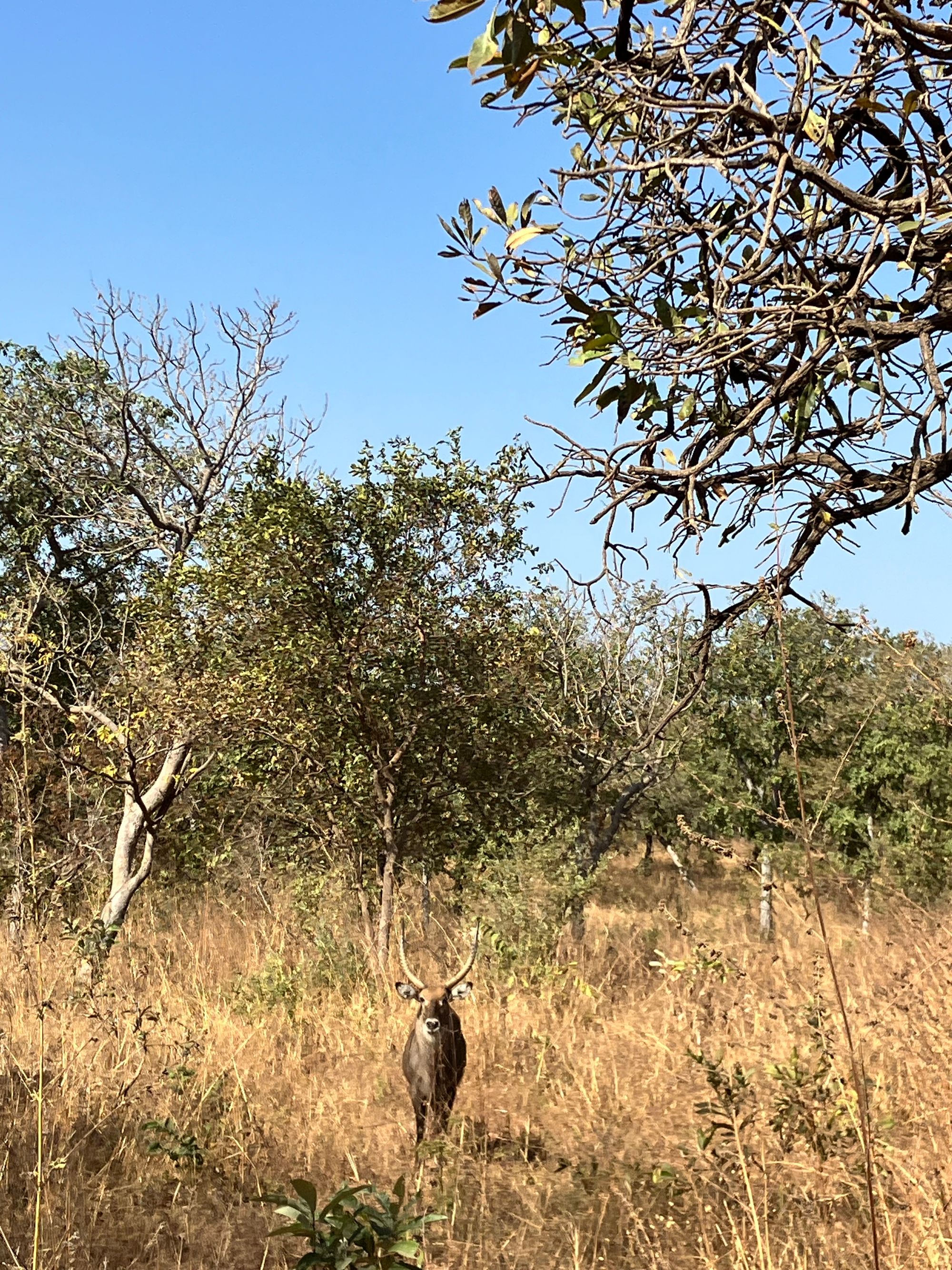
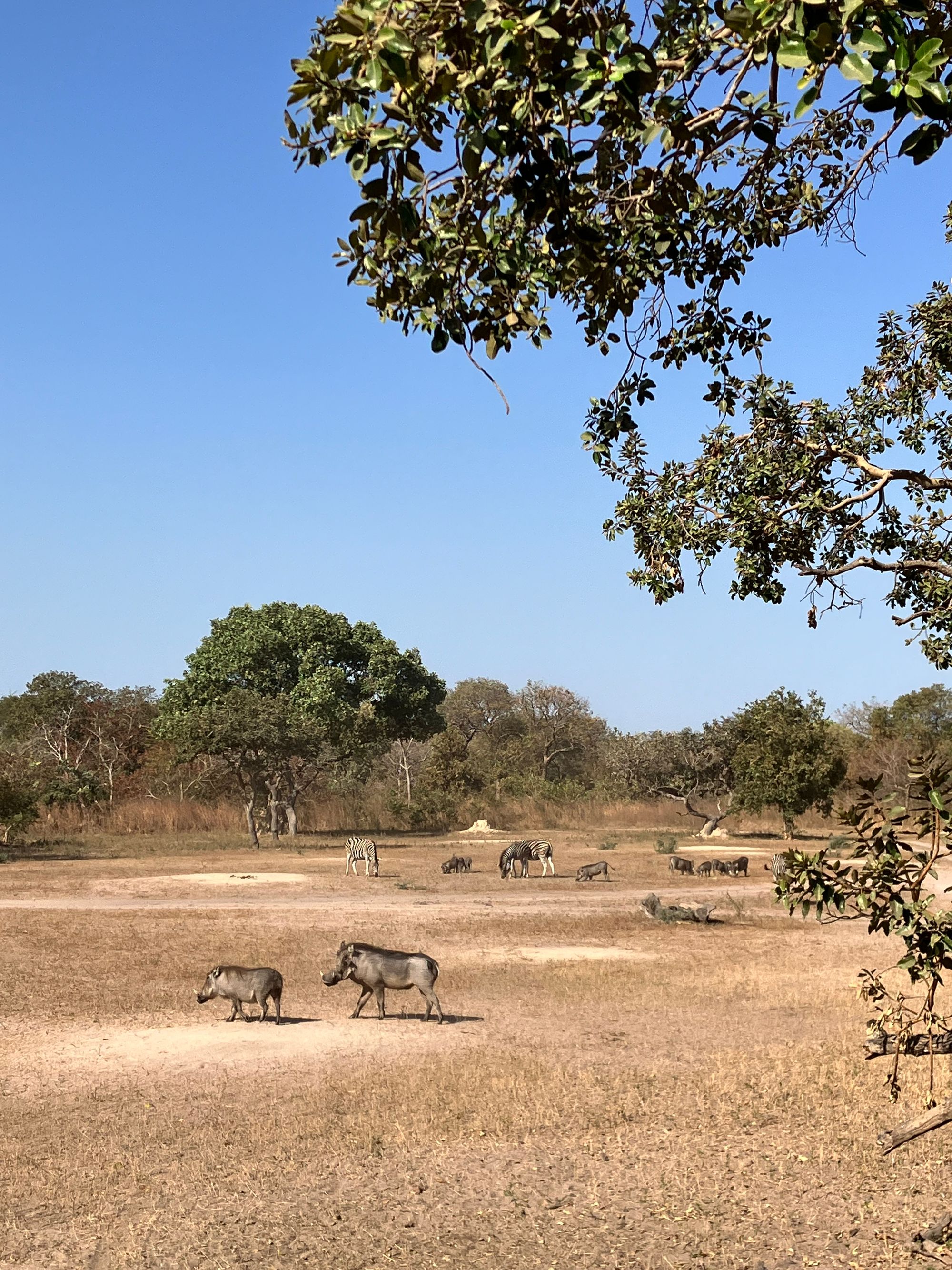
The adventure awaits, full speed ahead through thick shrubbery while trying to avoid being slapped by a stray branch. We felt exhilarated beyond words while spotting a rhinoceros that weighs 3 tons, zebras with their unique, fashionable stripes, and eland antelope that looks at you with such royal disdain and a lack of interest. "Kneel, you mortals!", you can almost hear them think. You see giraffes that are such graceful, elegant animals and their height makes you dizzy. You spot their blue tongues during their snacking on acacia leaves. You chuckle at how funny and at the same time muscular pumbaas are. You understand once and for all that animals are royalty in their own right, and that their beauty, dignity, and strength are unparalleled. The humans pale in comparison.
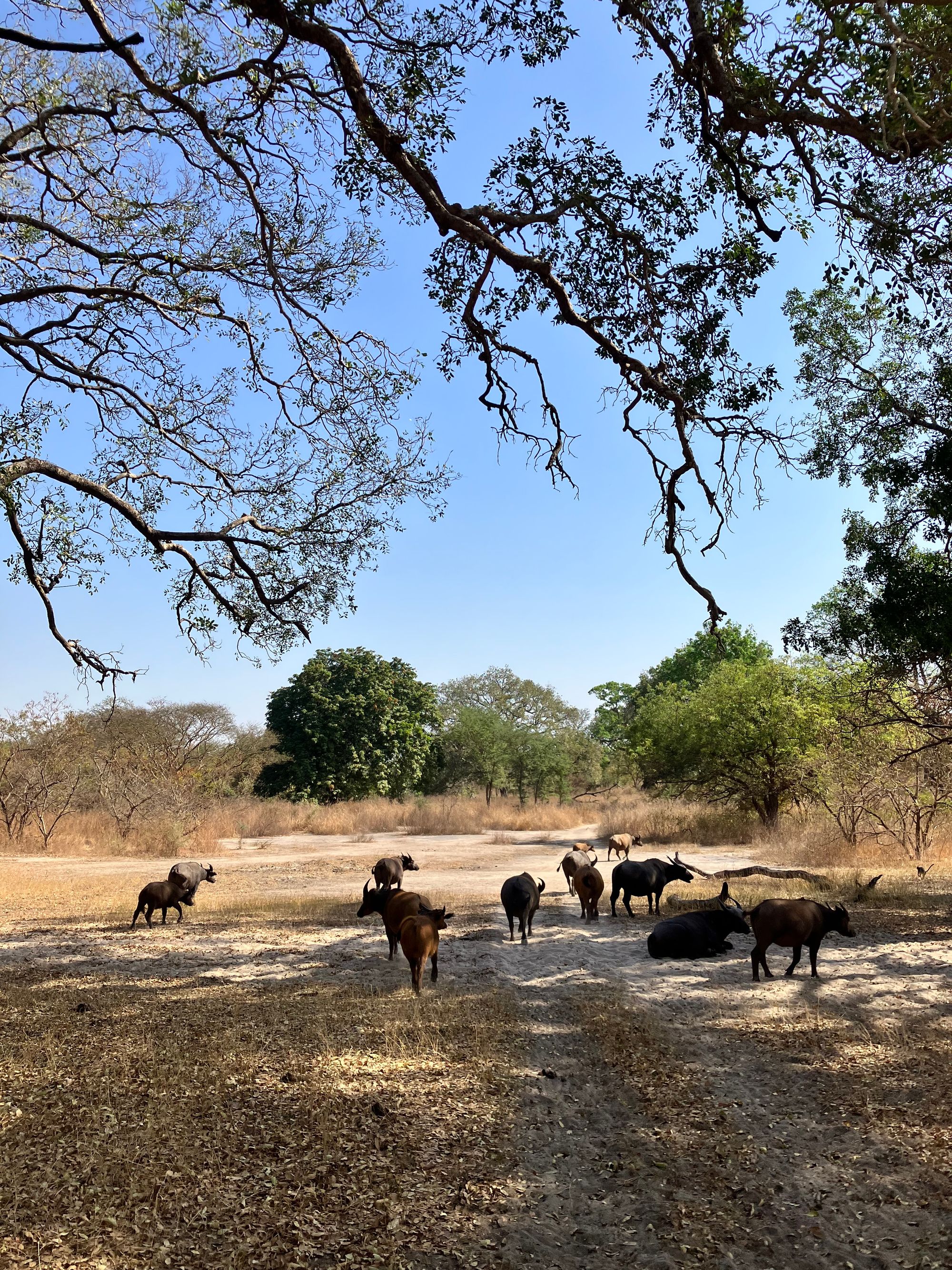
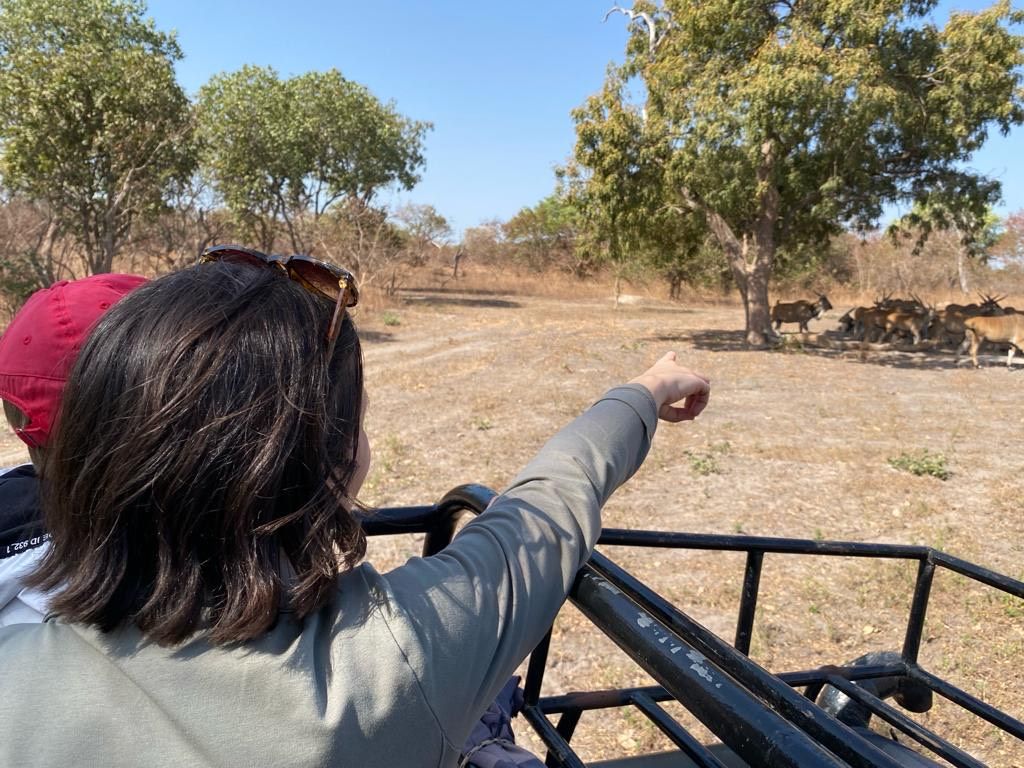
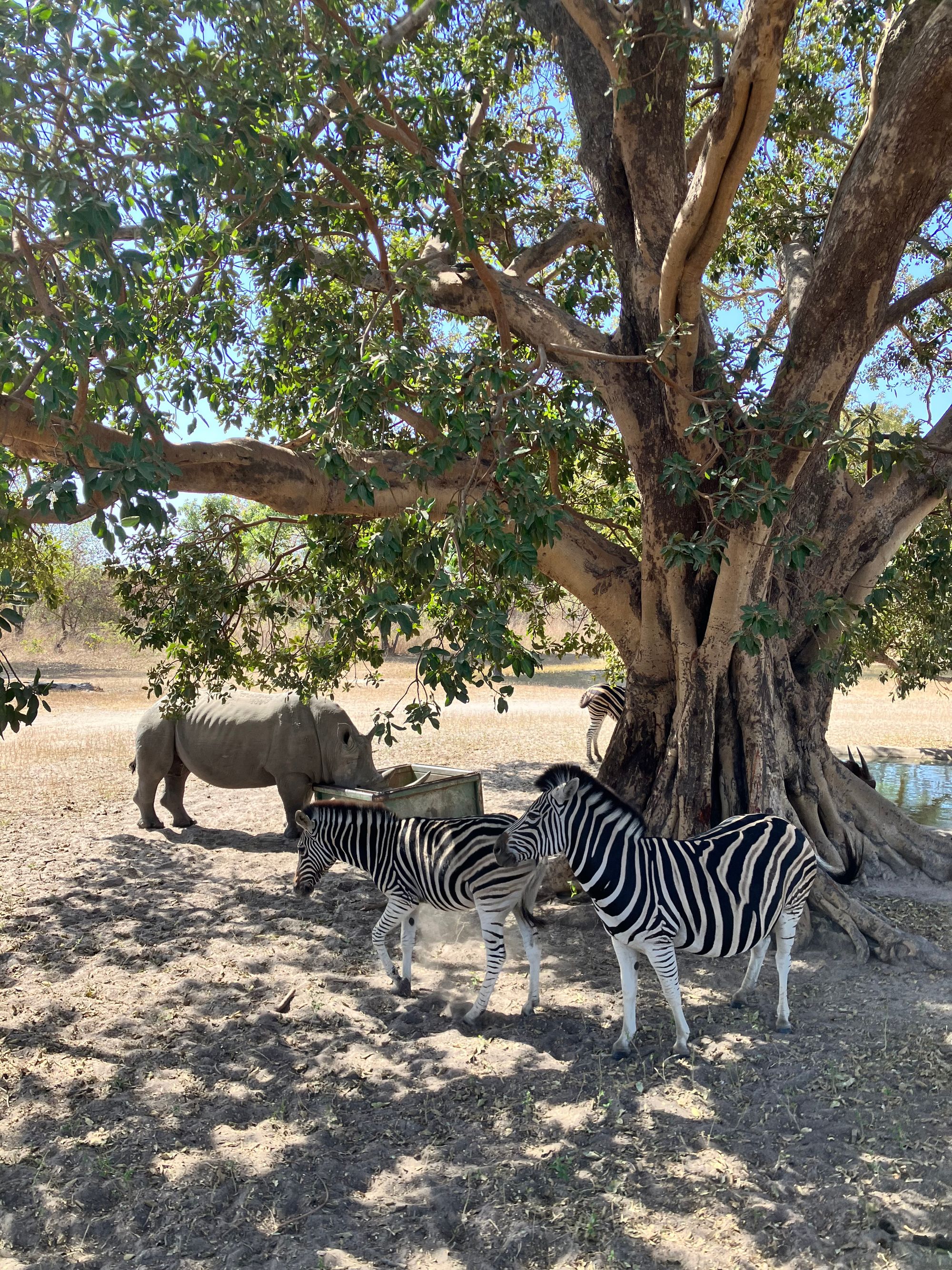
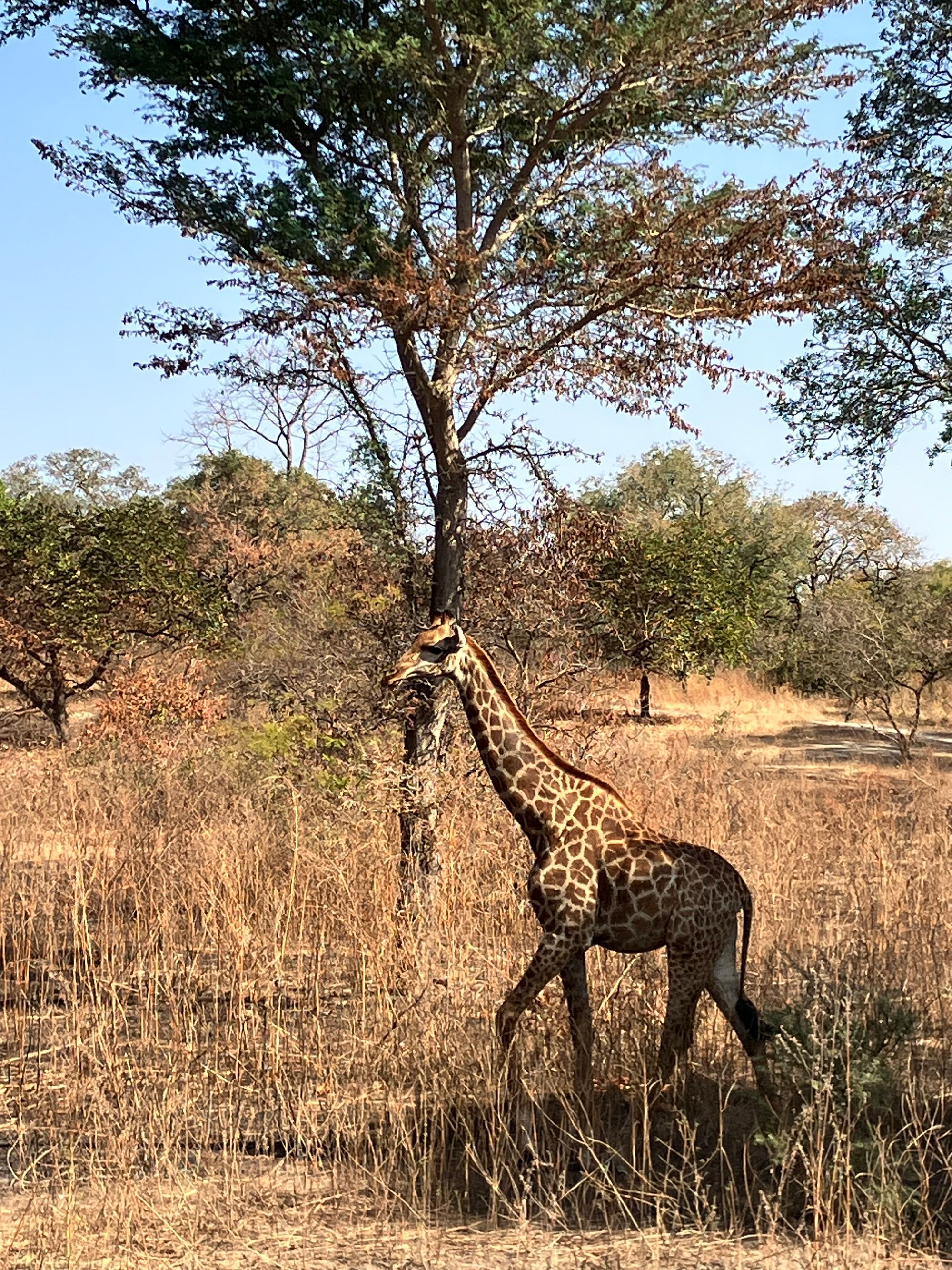
After a safari, the rest could only be silence. We retraced the steps and waved to all the grinning children shouting "Toubab!" at us. We sat quietly on the deck of the ferry, dusty and tired, lost in our thoughts and memories of an extraordinary day. And very soon, as if through a sleight of hand, we were on our way back to the Alps, from 33 degrees to -4, from swimsuits to ski suits. It still seems unbelievable that we have ever left Africa, though. I miss it, remember it, and viscerally yearn for it, while simultaneously enjoying all the perks of Western living. Such an ambivalent continent, like no other I have seen.
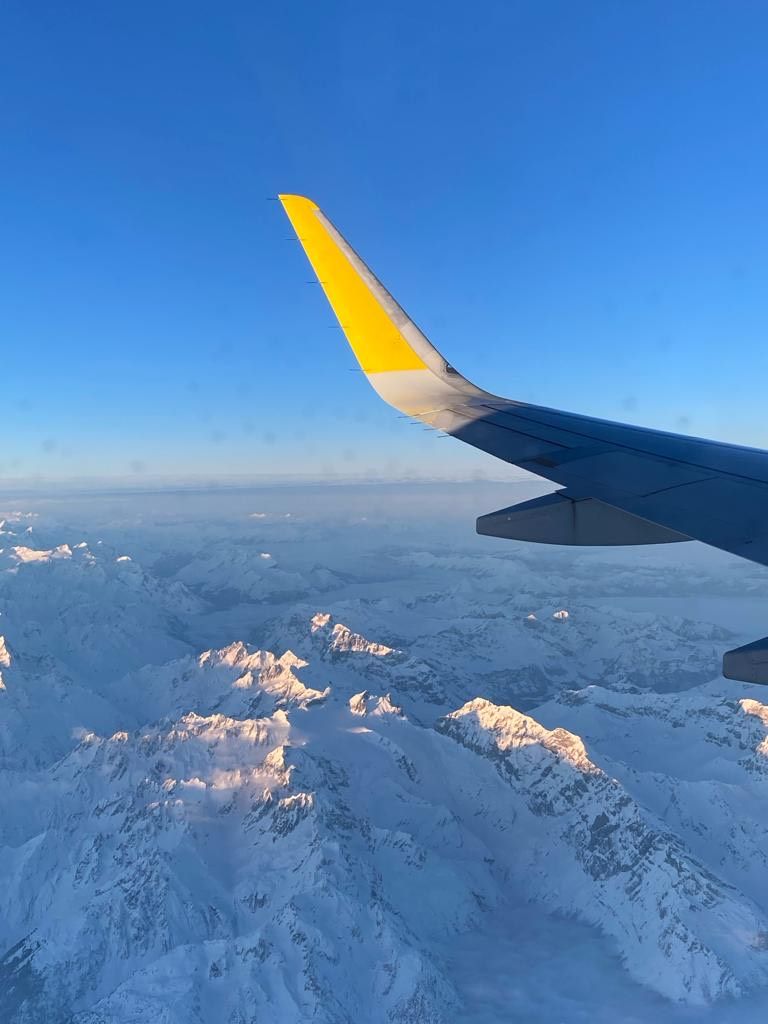
No matter how rich an impression a country leaves, I know that cannot be taken as a representation of the whole continent. So this is our raw, personal experience of Africa, through a stay in the Gambia, but at the same time, this is not all that this incredible continent is or can be. I know that I know nothing. In 10 years Gambia will be completely different, unrecognizable. With that being said, the feelings and insights that this travel gave us are manifold. What a complex, layered, chaotic, happy, energetic, poor, disorganized, full of promise and potential country this is. And although confused and conflicted, we are already cautiously discussing the next African chapter. Kenya? Nigeria? South African Republic? Live to tell.